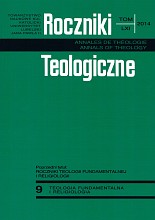Teologia komparatywna. Geneza, opcje, szanse i problemy
Comparative Theology. Origins, options, opportunities and problems
Author(s): Krystian KałużaSubject(s): Christian Theology and Religion
Published by: Towarzystwo Naukowe KUL & Katolicki Uniwersytet Lubelski Jana Pawła II
Keywords: comparative theology; theology of religions; religious studies; method; methodology; truth; religion
Summary/Abstract: This article describes the comparative theology and focuses on its critical assessment. As a scientific discipline, it has been developed mainly in Anglo-Saxon circles and recently in Germany, as well. In the first part the author presents origins and the concept of comparative theology. It is generally understood as a theological discipline which reflects on other religions within the frame of dialogue with religiological sciences, especially with the empirical comparative religion. The micro-logical nature (i.e. specific issues) and the consistently applied comparative method distinguish it from the theology of religions. It is not, however, a part of religious studies in general because it does not confine itself to mere description of religious phenomena, but it raises the question of its veracity. Comparative theologians do not distance themselves from their own religion, but they attempt to look at it from the perspective of other traditions in the context of genuine interreligious dialogue. The comparative theology is highly diverse (there is no just one conception of it). The author illustrates this diversity with the views of two comparative theologians: F.X. Clooney and R.C. Neville. The second part of the article deals with methodological issues. The methodological status of comparative theology has not been fully established yet. Two issues are particularly important here; the relation of the comparative theology with empirical religious studies and its relationship to the theology of religions. The author does not agree with the thesis that the comparative theology should replace the theology of religions. Decisive in this respect is the unclear theological nature of comparative theology. Mere focusing on the veracity of religious beliefs does not make theology out of it. The philosophy of religion raises this issue as well. On the other hand allegations of comparative theologians against the theology of religions are partly true (i.e. vagueness, apriority of judgments, underestimation of otherness/difference, etc.). In such a situation a creative cooperation of both disciplines could be the solution, with a “comparative theology of religions” as a final consequence.
Journal: Roczniki Teologiczne
- Issue Year: 61/2014
- Issue No: 09
- Page Range: 043-091
- Page Count: 49
- Language: Polish

